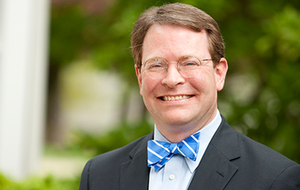
When Dr. Michael Bitzer is not teaching a class at Catawba College, you will often find him in his dining room in Salisbury, now converted into an office, doing Zoom interviews with reporters from the New York Times, the Washington Post, the Wall Street Journal, the Christian Science Monitor, the Atlanta Journal Constitution, NBC News, ABC News, MSNBC, Fox News, NPR, and other media.
Bitzer, an 18-year veteran of the Catawba Political Science Department, is facing his busiest political season ever, with the upcoming Nov. 3 election looming, and with North Carolina continuing its 12-year history as a battleground state. Politico recently said: “If President Trump can’t win North Carolina, he probably can’t win.”
Bitzer stays with the data. He remains a calm voice in this hurricane season of shifting political wind in North Carolina.
He is the T.P. and J.C. Leonard Chair of Political Science at Catawba, teaches politics and history, and is a pre-law advisor. He moves about campus in a friendly, easygoing manner, always in his trademark bow tie, and answering requests with his standard refrain: “Happy to do it.”
Somehow, he works it all into his schedule. You often hear him as political analyst or host on Charlotte Talks, the 9 a.m. weekday show on WFAE, Charlotte’s NPR news source. He was tapped as the station’s political expert for the 2016 election. He has co-authored chapters for the books The New Politics of the Old South and The Future Ain’t What It Used to Be: The 2016 Presidential Election in the South, as well as contributed to seven other books in his field, moderated state candidates’ forums, served as chair and discussant at conferences, and also provided political analysis for WSOC, WBTV, WCCB, and News-14.
Before the national conventions wrapped up in August, he was already averaging two to four media calls per day, and as the fall season progresses, he will be scrambling to keep up. “Already, the numbers that I’m putting out on vote-by-mail are generating a lot of attention,” he says.
His extensive political research and thought-provoking blogs on TheOldNorthState.com have brought the media to him. In addition, he follows a lot of reporters on Twitter (Twitter.com/BowTiePolitics) and that sets the stage. “Everyone is extremely interested in data,” he says. “It’s so easy in today’s politics to be opinion driven. Data is facts.”
Bitzer has immersed himself in North Carolina politics since arriving at Catawba in 2002. He originally found a wealth of information in State Board of Elections records. He grew up in Clemson, SC, majored in English with a specialization in theater as an undergrad, and did some behind-the-scenes political research for Clemson University before moving on to the University of Georgia, where he did research in Southern politics. “I have always had an affinity for politics of the South,” he says. “I’m always analyzing, trying to understand patterns.”
He sees the media attention as another means of educating people. “I am educating in the classroom, but also educating reporters and the public as well. Most reporters calling me are just trying to understand. I kind of describe the state of the state, in terms of its politics. Things change. A lot of reporters are looking for basic understanding.”
He finds it “increasingly difficult” to get his audiences, be they students or the public in general, to “step back and see different points of view. You can be partisan, but you can’t manipulate the facts or misunderstand the context,” he says.
Some of his students come into the program with partisan views. “I stress early on the right to express those views, as long as they respect and listen to the other side. Some of the students don’t know where they fit. The goal is to be truthful-making … to be sure that they are thinking critically.”
Students need to “own their own education,” he says. His students leave Catawba with an intellectual maturity, prepared for the rigor of law school or other courses of study, he says. “I will get an email or text from a former student saying, ‘It was hard having you, but I understand why you did it. I am able to handle this environment.’ “
The 2020 election season is a challenging to a political analyst. “The biggest hurdle that I’m facing with vote-by-mail is because of unfounded, unsubstantiated allegations that there will be rampant fraud. It’s a lie. The research proves it, but people are so wedded to partisan affiliation that unfortunately, facts don’t matter. I feel that I’m a broken record, in having to swat down unsubstantiated records. Welcome to 2020.”
His biggest surprise in the political world of today is the increasing polarization. “As a political scientist, I have taught courses on polarization. But just when I think it can’t get any more decisive, I find that it does. As a citizen, I am concerned about where we go from here … the level of animosity, the bitterness is overwhelming. A lot of people find it overwhelming, and I am one of them.”
On election night, Bitzer will be talking data with WFAE viewers. “This will be a consequential election,” he says. COVID-19 is an issue, and vote-by-mail will be a major factor. “We’ve never seen this kind of numbers in this state,” he says.
He is carefully watching millennials and Generation Z voters, as well as voters in the suburbs of urban counties.
“I think we are at an inflection point. This election could point the country in a very different direction than what we’ve seen in the past 40 years. This is an election that shifts who has the power dramatically. The country is moving in a host of areas, particularly racial, much like the election of 1980, 1932, and kind of like 1968.”
